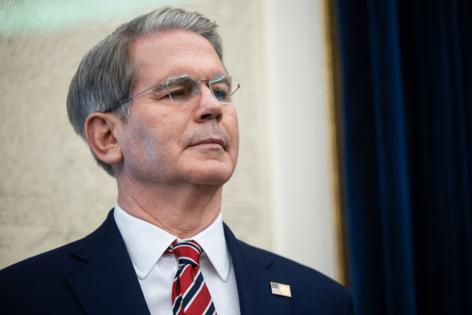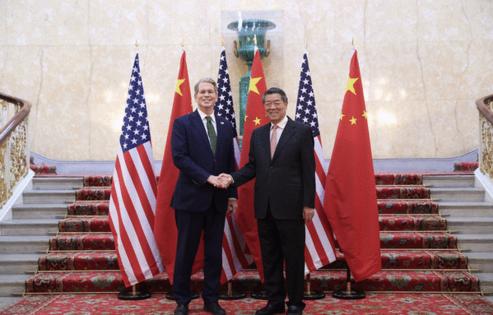Treasury Secretary Bessent returns to Washington as US-China talks stretch on
Published in News & Features
U.S. Treasury Secretary Scott Bessent departed trade talks with China late Tuesday in London, as delegations continued to negotiate over key tech and industrial exports and deescalating their trade war.
Bessent told reporters he had to return to Washington in order to testify before Congress. U.S. Commerce Secretary Howard Lutnick and U.S. Trade Representative Jamieson Greer planned to continue discussions with their Chinese counterparts “as needed,” Bessent said.
“We have had two days of productive talks, they are ongoing,” the Treasury secretary said before leaving Lancaster House, a Georgian-era mansion near Buckingham Palace serving as the meeting site.
Financial markets were closely watching Tuesday as the world’s largest economies continued talks over the terms of their tariff truce brokered last month. U.S. stocks rose to session highs after Lutnick said earlier the talks were “going really, really well.”
The teams, which had led by Bessent and Chinese Vice Premier He Lifeng, were still holding discussions Tuesday night in order to iron out technical details, according to a Treasury official.
The key issue this week is re-establishing terms of an agreement reached in Geneva last month, in which the U.S. understood that China would allow more rare earth shipments to reach American customers. The Trump administration accused Beijing of moving too slowly, which threatened shortages in domestic manufacturing sectors.
In return, the Trump administration is prepared to remove a recent spate of measures targeting chip design software, jet engine parts, chemicals and nuclear materials, people familiar with the matter said. Many of those actions were taken in the past few weeks as tensions flared between the U.S. and China.
‘Win by China’
“A U.S. decision to roll back some portion of the technology controls would very much be viewed as a win by China,” said Dexter Roberts, nonresident senior fellow at the Atlantic Council’s Global China Hub, adding that the possibility of unwinding “any controls” seemed “pretty much unthinkable” until recently.
A month ago Beijing and Washington agreed to a 90-day truce through mid-August in their crippling tariffs to allow time to resolve many of their trade disagreements — from tariffs to export controls.
Lancaster House carries historical significance. It has hosted major addresses by UK prime ministers, speeches by central bank governors and parties for Britain’s royal family.
At the same time, Trump’s trade team is scrambling to secure bilateral deals with India, Japan, South Korea and several other countries that are racing to do so before July 9, when the U.S. president’s so-called reciprocal tariffs rise from the current 10% baseline to much higher levels customized for each trading partner.
Meanwhile, Chinese President Xi Jinping on Tuesday held his first phone conversation with South Korea’s newly elected President Lee Jae-myung and called for cooperation to safeguard multilateralism and free trade.
“We should strengthen bilateral cooperation and multilateral coordination, jointly safeguard multilateralism and free trade, and ensure the stability and smoothness of global and regional industrial chains and supply chains,” Xi said, according to the CCTV report.
_____
(With assistance from Colum Murphy and Stephanie Lai.)
_____
©2025 Bloomberg L.P. Visit bloomberg.com. Distributed by Tribune Content Agency, LLC.










Comments